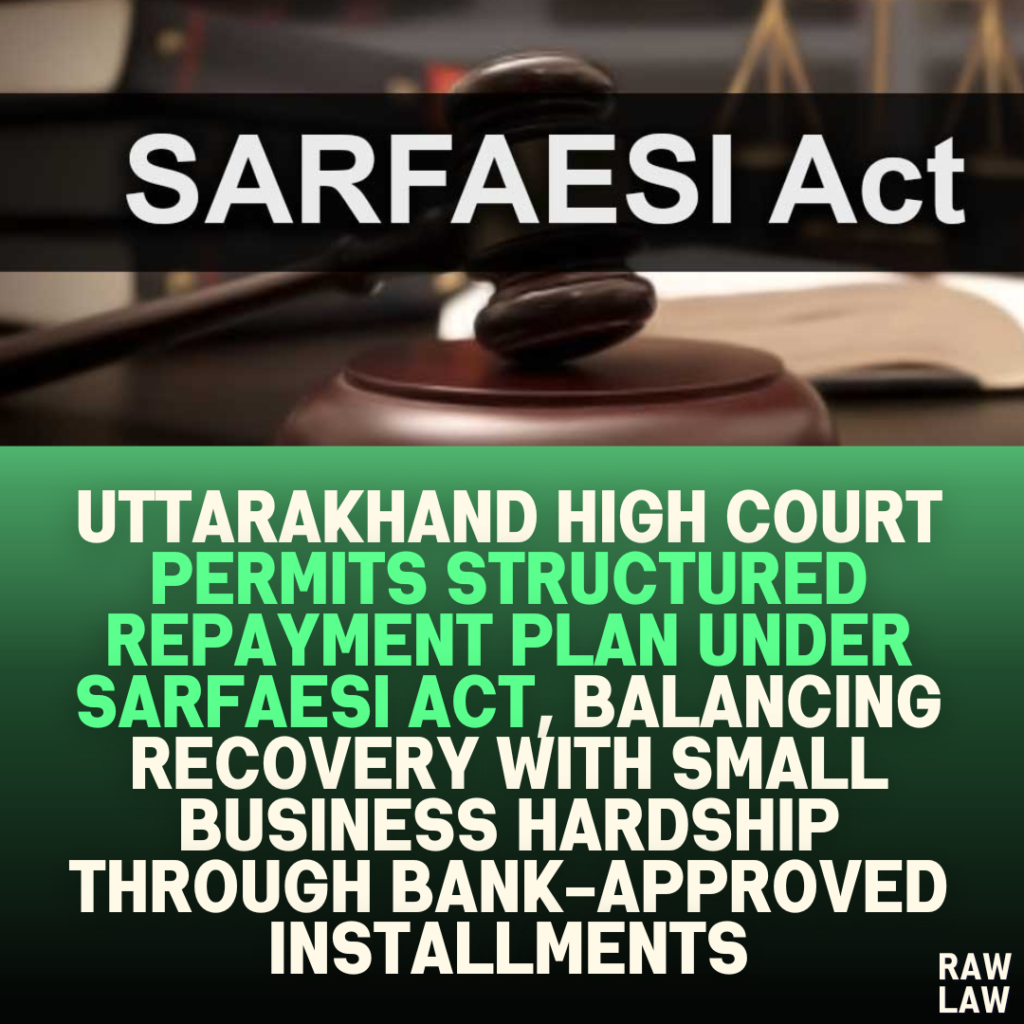Court’s Decision:
The Uttarakhand High Court disposed of the writ petition, allowing the petitioner to repay the outstanding amount of ₹20,40,538 in four installments, with accrued interest. The court set a structured payment schedule, noting that the bank may proceed with recovery if any installment is missed.
Facts:
The petitioner, a small shop owner, was granted a loan of ₹15,00,000 in 2022. However, due to the petitioner’s financial hardship, the loan turned into a Non-Performing Asset (NPA). Consequently, the bank initiated recovery proceedings under the Securitization and Reconstruction of Financial Assets and Enforcement of Security Interest Act, 2002 (SARFAESI Act), which prompted the petitioner to approach the court for relief.
Issues:
The main issue was whether the petitioner, who expressed willingness to repay the loan amount in installments, could be granted a structured repayment plan considering his limited means.
Petitioner’s Arguments:
The petitioner argued that he was financially constrained and could not repay the entire loan amount in a lump sum. He requested permission to clear the outstanding dues in installments, as he lacked the means to meet a full repayment immediately.
Respondent’s Arguments:
The bank’s counsel agreed to a repayment plan, expressing no objections to the petitioner’s proposal to pay in installments, as the bank’s primary concern was the recovery of the outstanding amount.
Analysis of the Law:
The SARFAESI Act, 2002, enables secured creditors to recover debts without court intervention through mechanisms such as asset repossession. Under Section 14, banks may seek the District Magistrate’s assistance to take possession of secured assets. However, in this case, the petitioner sought judicial intervention to facilitate installment-based repayment.
Precedent Analysis:
While the judgment does not cite specific precedents, the court’s approach aligns with previous cases where financially distressed borrowers were permitted structured repayments to avoid asset seizure.
Court’s Reasoning:
The court acknowledged the petitioner’s limited financial means and his commitment to repay the loan. Considering the bank’s agreement to an installment plan, the court structured the payment schedule to balance recovery with the petitioner’s financial constraints.
Conclusion:
The court ordered that the petitioner repay ₹7,00,000 within 45 days, followed by three quarterly installments of ₹3,35,134.5 each, with accrued interest on the final installment. It emphasized that failure to meet any installment would permit the bank to initiate recovery as per legal provisions.
Implications:
This judgment underscores the court’s discretion to tailor financial recovery measures for small business owners under the SARFAESI Act. It highlights judicial consideration of borrower hardships while ensuring creditor rights remain intact, setting a precedent for similar cases involving financially constrained petitioners facing asset repossession.




Pingback: Bombay High Court Upholds Artistic Freedom, Quashes Customs' Confiscation Order: "Freedom of Expression Cannot Be Curbed by Personal Morality; Not Every Nude Is Obscene" - Raw Law